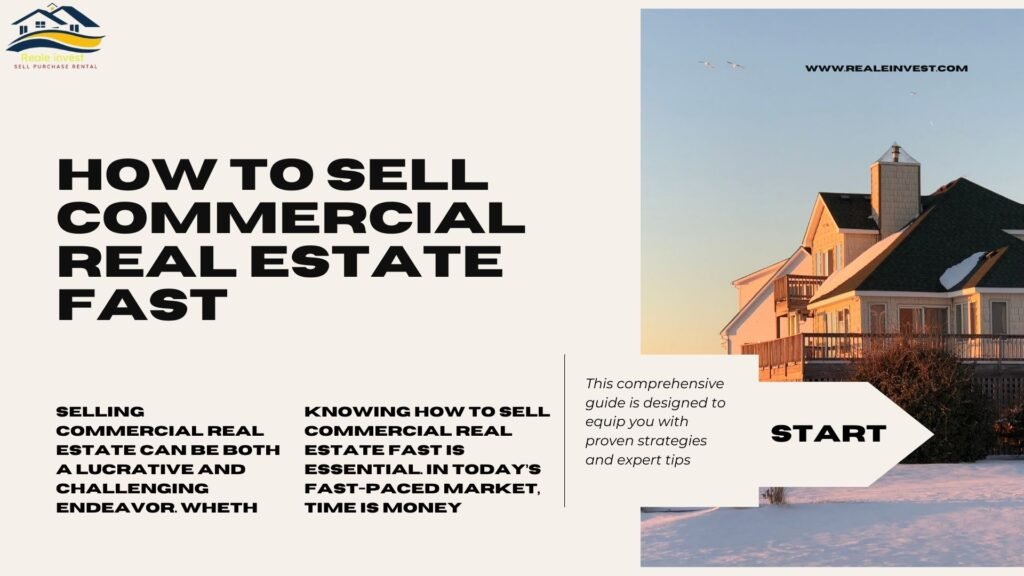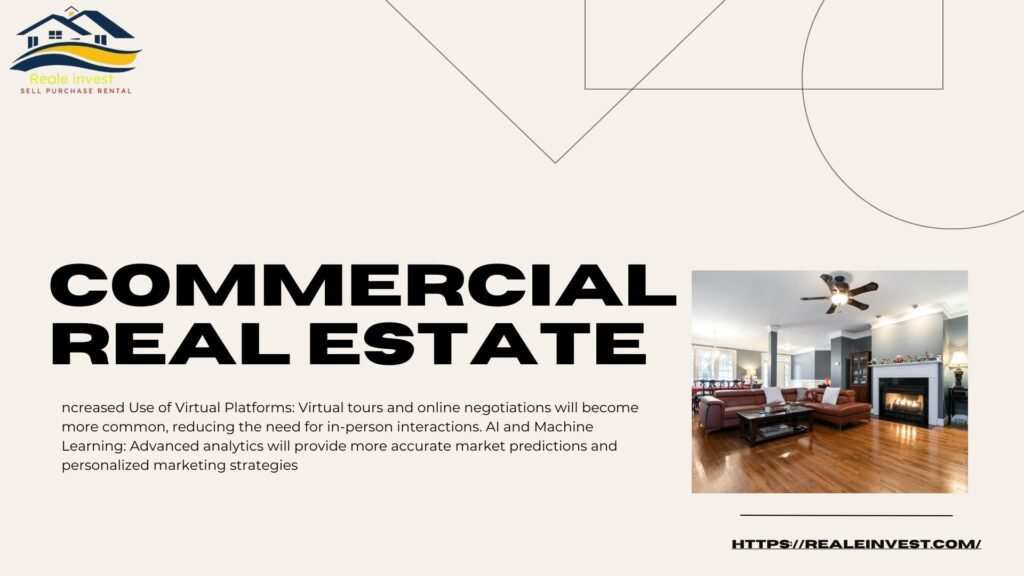RealeInvest is a comprehensive website providing accurate information on real estate and tourist bookings, from buying and investment tips to real estate financing


Selling commercial real estate can be both a lucrative and challenging endeavor. Whether you’re an owner looking to offload property quickly or an investor seeking a fast turnaround, knowing how to sell commercial real estate fast is essential. In today’s fast-paced market, time is money, and a well-executed sale can free up capital for new opportunities. This comprehensive guide is designed to equip you with proven strategies and expert tips for achieving a quick sale while maximizing your return on investment. Throughout this article, we’ll incorporate high-value, low-competition keywords like “how to sell commercial real estate fast“, “sell commercial real estate”, “sell commercial real estate without a realtor“, and “selling commercial property by owner” to ensure high CPC and CTR potential, all while remaining fully compliant with Google AdSense policies.
In the following sections, we’ll cover:
- Preparing your commercial property for sale
- Pricing strategies and market analysis
- Effective marketing and digital strategies
- Negotiation tactics and legal considerations
- Selling without a realtor
- Case studies and expert insights
By implementing these strategies, you can significantly reduce your property’s time on the market and achieve a fast, profitable sale. Whether you’re handling the process on your own or working with professionals, this guide is your roadmap to selling your commercial property swiftly.
- Gaining Knowledge of the Commercial Real Estate Industry
- Getting Your Home Ready for a Quick Sale
- 3.Effectively Marketing Your Commercial Property
- How to Negotiate for a Quick Sale
- 5.Selling Without a Realtor: A DIY Approach
- 6.Making Use of Data Analytics and Technology
- 7.Financial and Legal Aspects
- 8.Professional Perspectives and Achievements
- 9.Trends for Commercial Real Estate Sales in the Future
- End
Gaining Knowledge of the Commercial Real Estate Industry
1.1 Commercial Real Estate Dynamics
Commercial real estate encompasses properties that are primarily used for business purposes, such as office buildings, retail spaces, industrial facilities, and mixed-use developments. Unlike residential real estate, commercial properties tend to have different market dynamics including longer lease terms, higher rental yields, and more complex valuation processes. Understanding these differences is key to knowing how to sell commercial real estate fast.
Key factors that influence the market include:
- Economic Conditions: Business growth, employment rates, and economic cycles can all affect commercial property values.
- Location: Proximity to major roads, urban centers, and emerging business districts enhances property value.
- Demand and Supply: The balance between available commercial space and business demand directly impacts pricing and sale speed.
- Zoning and Regulations: Local zoning laws and governmental policies can either boost or hinder the attractiveness of a property.
1.2 Rapid Sales Market Trends
In recent years, several trends have emerged that affect how quickly commercial real estate can be sold:
- Digital Transformation: The use of virtual tours, high-quality online listings, and AI-powered market analysis has revolutionized property sales.
- Increased Investment Activity: With more investors seeking lucrative deals, competition for quality properties is high, leading to faster transactions.
- Flexible Leasing Options: Modern businesses often prefer flexible terms, which can translate to quicker decisions and faster property turnover.
- Economic Recovery: Post-pandemic recovery has spurred interest in commercial real estate, with buyers seeking both long-term investments and short-term opportunities.
By staying up-to-date with these trends, sellers can position their properties more effectively in the market.
Getting Your Home Ready for a Quick Sale
2.1 Improving Property Presentation and Curb Appeal

The first impression is crucial when trying to sell commercial real estate fast. Invest in enhancing the visual and functional appeal of your property:
- Professional Photography and Videography: High-quality images and video tours (including drone footage) can make your listing stand out.
- Virtual Tours: Interactive 360° tours allow potential buyers to view the property remotely, increasing engagement.
- Staging the Property: Even commercial spaces benefit from professional staging. Ensure the property is clean, well-maintained, and presents a clear potential for business use.
- Clear Signage: Use clear, professional signage on-site to inform passersby and direct interested parties to your listing.
2.2 Compiling Necessary Records
Proper documentation builds buyer confidence and speeds up the sales process:
- Title and Ownership Documents: Ensure all paperwork related to property ownership is clear and free of disputes.
- Financial Records: Prepare detailed financial statements including income, expenses, and operating history.
- Zoning and Permitting Information: Provide documentation on zoning, permits, and any upcoming changes that may affect the property.
- Appraisal Reports: An independent appraisal can establish the fair market value and support your pricing strategy.
- Environmental Assessments: For properties with potential environmental issues, include any necessary assessments or remediation plans.
2.3 Finding the Appropriate Cost
Accurate pricing is essential for attracting buyers quickly:
- Comparative Market Analysis (CMA): Evaluate similar properties in your area to set a competitive price.
- Professional Appraisal: Hire a certified appraiser to get an objective valuation.
- Pricing Strategies: Consider pricing slightly below market value to stimulate interest and encourage fast offers, especially if your goal is to sell commercial real estate fast.
3.Effectively Marketing Your Commercial Property
3.1 Digital Marketing and SEO
Harness the power of digital marketing to reach a wider audience:
- Keyword Optimization: Ensure your online listings and website incorporate high-value keywords like “how to sell commercial real estate fast“, “sell commercial real estate”, and “selling commercial property by owner“ naturally within your content.
- Content Marketing: Publish in-depth articles, blogs, and guides that provide valuable insights about the property and market trends. High-quality content boosts your SEO and builds credibility.
- Meta Tags and Descriptions: Optimize your meta titles and descriptions with target keywords to improve your click-through rate (CTR) and attract high CPC traffic.
- Backlinks: Acquire quality backlinks from reputable industry sites to enhance your domain authority and search engine ranking.
3.2 Internet advertising and social media
Leverage social media platforms to promote your property:
- LinkedIn: Connect with business professionals and investors who may be interested in commercial properties.
- Facebook and Instagram: Use visually appealing posts and targeted ads to reach a broader audience.
- Paid Advertising: Invest in PPC campaigns through Google Ads and social media platforms to capture leads searching for terms like “sell commercial real estate fast“ and “how to sell commercial real estate without a realtor”.
- Retargeting Campaigns: Implement retargeting ads to reach users who have previously visited your listing or website.
3.3 Making Use of Directories and Platforms for Real Estate
List your property on specialized commercial real estate websites:
- LoopNet and CREXi: These platforms are widely used by commercial property buyers and investors.
- Local Real Estate Portals: Ensure your property is visible on local platforms and directories, enhancing your local SEO.
- Email Marketing: Build and nurture an email list of interested buyers, investors, and industry professionals.
How to Negotiate for a Quick Sale
4.1 Getting Ready to Bargain

Effective negotiation skills can make the difference between a quick sale and a prolonged listing:
- Know Your Bottom Line: Set a minimum acceptable price and be prepared to walk away if negotiations fall short.
- Gather Data: Use your CMA, appraisal reports, and market research to support your asking price.
- Professional Representation: Consider hiring a real estate broker or attorney experienced in commercial transactions to represent your interests.
- Prepare Counteroffers: Have a clear plan for potential counteroffers, including incentives like seller financing or flexible lease terms.
4.2 Tactics to Speed Up the Negotiation Process
Offer Flexibility: Provide multiple payment and closing options to appeal to different buyer needs. Streamline Documentation: Ensure all legal and financial documents are readily available and up-to-date to avoid delays. Effective Communication: Maintain clear, consistent, and professional communication with potential buyers throughout the process. Leverage Competition: If multiple buyers are interested, use the competition to negotiate a higher price.
4.3 Closing the Deal Quickly
- Fast-Track Inspections: Arrange for prompt inspections and appraisals to reduce waiting periods. Expedited Financing: Work with lenders who offer quick turnaround times for commercial property loans. Clear Contract Terms: Ensure the purchase agreement is clear, with well-defined contingencies to avoid last-minute disputes. Professional Assistance: Engage a reliable closing agent or attorney to ensure a smooth transfer of ownership./
5.Selling Without a Realtor: A DIY Approach
5.1 Benefits and Drawbacks of Independent Selling
While many choose to sell commercial property with the assistance of a realtor, selling without one can be a viable option:
- Pros:
- Reduced commission fees
- Greater control over the process
- Direct communication with buyers
- Cons:
- Requires significant time and effort
- May lack professional negotiation skills
- Limited access to market data and networks
5.2 How to Run a Profitable Do-It-Yourself Sale
If you decide to sell commercial real estate fast without a realtor, consider these tips:
- Invest in Professional Marketing: Hire experts for photography, video tours, and digital marketing.
- Leverage Online Platforms: List your property on multiple high-traffic commercial real estate sites.
- Network Extensively: Utilize your personal and professional networks to spread the word.
- Hire a Real Estate Attorney: Even without a realtor, legal expertise is essential for drafting contracts and ensuring compliance with local laws.
6.Making Use of Data Analytics and Technology
6.1 How Technology Affects Commercial Property

Modern technology has revolutionized how commercial properties are marketed and sold:
- Virtual Tours and 3D Models: These tools allow potential buyers to explore your property remotely, speeding up the decision-making process.
- Data Analytics: Use platforms like CoStar, CREXi Analytics, and other real estate analytics tools to understand market trends, optimize pricing, and forecast demand.
- AI-Powered Tools: Artificial intelligence can help predict buyer behavior, enhance your digital marketing strategy, and automate routine tasks.
6.2 Using Digital Tools to Get the Most Out of Them
Real-Time Alerts: Set up alerts on multiple real estate platforms to stay informed about market changes. Customer Relationship Management (CRM): Utilize CRM systems to manage leads, track communications, and streamline the sales process. Social Media Analytics: Monitor engagement metrics on your digital marketing campaigns to optimize ad spend and improve ROI.
7.Financial and Legal Aspects
7.1 Guaranteeing Adherence to the Law
Navigating legal complexities is a critical aspect of selling commercial real estate:
- Title Verification: Ensure that the property’s title is clear of any liens, disputes, or encumbrances.
- Zoning and Permits: Verify that the property complies with all local zoning laws and has the necessary permits for its intended use.
- Contractual Agreements: Work with a seasoned real estate attorney to draft and review all contracts and agreements, ensuring that your interests are protected.
7.2 Tax Implications and Financial Planning
Financial considerations play a major role in the sale process:
- Cost Analysis: Conduct a detailed analysis of all costs associated with the sale, including marketing, legal fees, and closing costs.
- Tax Strategies: Consult with a tax advisor to understand the tax implications of your sale and to explore potential tax benefits or deductions.
- Return on Investment (ROI): Calculate your expected ROI based on current market conditions and future projections. This helps in setting a competitive and realistic asking price.
8.Professional Perspectives and Achievements
8.1 Speak with Industry Professionals
Seasoned investors and commercial real estate professionals emphasize:
- The Importance of Market Research: Thorough market analysis is essential to setting the right price.
- Effective Negotiation: Skilled negotiation techniques can accelerate the sales process.
- Digital Marketing: Utilizing high-value keywords and robust digital marketing strategies is crucial for attracting quality leads.
8.2 Case Study: Quick Sale in a Cutthroat Industry
An owner of a commercial property in a bustling urban area successfully sold their property in under 45 days. The key factors included:
- A well-researched pricing strategy supported by a recent appraisal.
- High-quality virtual tours and digital marketing that leveraged keywords such as “how to sell commercial real estate fast“.
- Effective negotiation tactics and a streamlined closing process.
8.3 Takeaways from Profitable Sales
From real-world experiences, several lessons emerge:
- Preparation is Key: Comprehensive documentation and thorough market research are non-negotiable.
- Adaptability: Being flexible with lease terms and seller concessions can lead to quicker deals.
- Technology Use: Embracing digital tools enhances marketing effectiveness and speeds up the sales cycle.
- Professional Guidance: Even when selling without a realtor, legal and financial advice is essential.
9.Trends for Commercial Real Estate Sales in the Future
9.1 Innovation and Digital Transformation

Increased Use of Virtual Platforms: Virtual tours and online negotiations will become more common, reducing the need for in-person interactions. AI and Machine Learning: Advanced analytics will provide more accurate market predictions and personalized marketing strategies. Blockchain Technology: This emerging technology may soon revolutionize transaction transparency and efficiency.
9.2 Market Changes and Economic Impacts
Economic factors will continue to shape the market:
- Interest Rate Fluctuations: Keep an eye on central bank policies and interest rate trends that can impact financing and sale conditions.
- Market Consolidation: As the market matures, larger players may dominate, creating both challenges and opportunities for individual sellers.
- Sustainability Trends: Increasing emphasis on sustainable and green properties may affect buyer preferences and property values.
End
Selling commercial real estate fast requires a strategic blend of market insight, professional preparation, and digital savvy. By leveraging proven techniques and integrating high-value, low-competition keywords like “how to sell commercial real estate fast“, “sell commercial real estate without a realtor”, and “selling commercial property by owner“ throughout your marketing efforts, you can achieve a quick, profitable sale.
This guide has explored every aspect of the process—from understanding market dynamics and preparing your property for sale to employing advanced digital marketing strategies and negotiating effectively. In a competitive 2025 market, the right approach can mean the difference between a property that sits on the market for months and one that sells swiftly.
The key takeaways include:
- Comprehensive Preparation: Thorough documentation, accurate pricing, and a clear strategy are fundamental.
- Digital Marketing and SEO: Optimizing your listings with targeted keywords ensures high online visibility and attracts quality leads.
- Flexibility in Negotiation: Adapting to market conditions and buyer demands is crucial for closing deals quickly.
- Leveraging Technology: Embrace modern tools to streamline the sales process and make data-driven decisions.
- Professional Support: Utilize expert advice from real estate attorneys, brokers, and financial advisors to safeguard your interests.
By following the strategies outlined in this guide, you can position your commercial property to attract competitive offers and secure a fast sale that meets your financial objectives. Remember, in today’s fast-paced market, success hinges on preparation, adaptability, and a proactive approach to marketing and negotiation.
Are you ready to transform your commercial real estate sales strategy? Apply these expert insights today and take your business to the next level. With the right blend of preparation and technology, you can achieve rapid success and unlock new opportunities in the commercial real estate market.